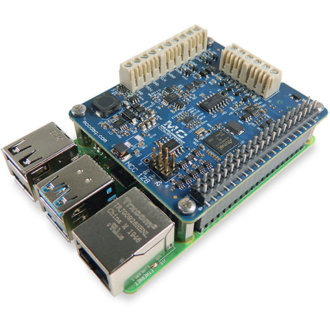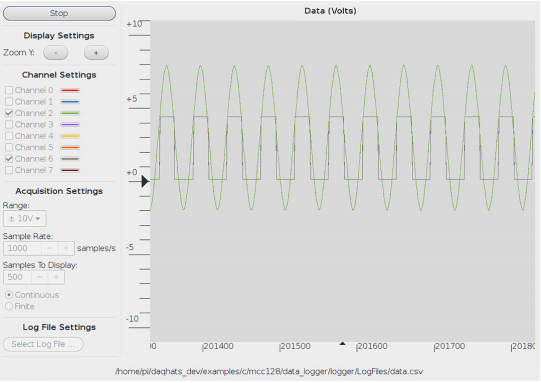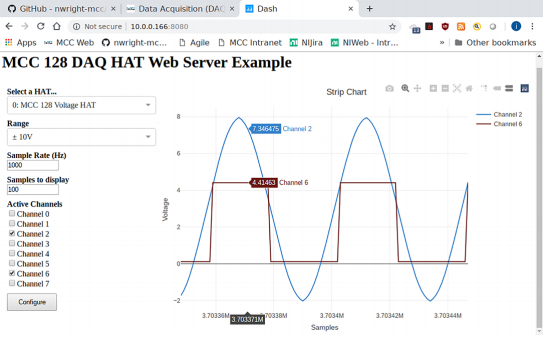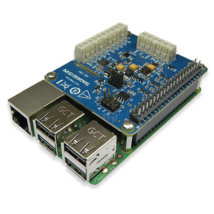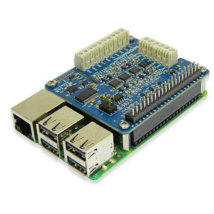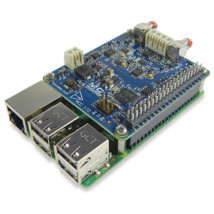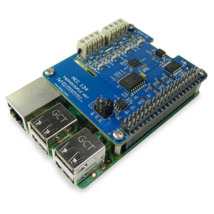| MCC 128 | DAQ HAT module, 8 voltage inputs, 16-Bit, 100 KS/s for Raspberry Pi®, OEM version | |
| MCC 128-OEM | DAQ HAT module, 8 voltage inputs, 16-Bit, 100 KS/ s for Raspberry Pi® |
MCC 128 - DAQ-HAT MCC with 8 SE/4 DIFF A/D 16-Bit, 100KS/s for Raspberry Pi®
- 8 SE/4 DIFF analog inputs
- 16-Bit Resolution
- Sampling rate of 100Ke / s (in total 320Ke / s for stacked cards)
- Input ranges: ±10 V, ±5 V, ±2 V, ±1 V
- Built-in memory enables high-speed acquisition
- External clock input
- External trigger digital input
- Screw terminal connections
- Ability to stack up to eight MCC HATs on a single Raspberry Pi® for a maximum throughput of 320 KS/s
- API for C, C++, Python
- Available in card version for OEM applications
MCC 128: DAQ-HAT MCC with 8 SE/4 DIFF A/D 16-Bit, 100KS/s for Raspberry Pi®
Measurement Computing’s (MCC) MCC 128 is a DAQ-HAT for Raspberry Pi® providing eight SE analog inputs or four, 14-bit DIFF analog inputs, multiplexed analog inputs, 16-Bit resolution and an input range of ±10 V, ±5 V, ±2 V, ±1 V. The maximum sample rate is 100KS/s (aggregate). The total acquisition rate for all channels cannot exceed 100KS/s.
MCC 128 also has an external clock input. You can use the software to select the timing of the acquisition (by internal clock or by external clock). Finally, the acquisition can be triggered via an external trigger that can be configured by software on a rising or falling edge, or a high or low level.
On a Raspberry Pi®, you can stack up to eight MCC HATs providing 64 channels for a maximum throughput of 320 KS/s.
Library and examples provided
An open-source MCC DAQ HAT library (for C / C ++ and Python) is also available with MCC 128. It allows users to develop applications on Linux. The library is available for download on GitHub. Full API and hardware documentation is provided.
The MCC DAQ HAT Library includes example programs developed in C/C++ and Python that users can run to become familiar with the DAQ HAT library and boards; source code is included.
- Console-Based (C/C++ and Python)
Console-based examples are provided that demonstrate how to perform continuous and finite scans, trigger an acquisition, and synchronously acquire data from multiple DAQ HATs (source included). The continuous_scan example is shown here.
- User Interface
Example programs featuring a user interface are provided in different formats. Examples of each are shown here- DataLogger (C / C ++)
The datalogger example shows how to acquire data from the MCC 118, display the data on a strip chart, and log the data to a CSV file. This example can be run from the terminal.
- DataLogger (C / C ++)
-
- Web Server (Python)
The web server example lets users configure acquisition options and view acquired data from a browser window. This example is written for Python (source included).
- Web Server (Python)
Find all MCC ‘s DAQ-HAT modules on our website
mcc-128 mcc128
You may also like…
-
MCC 152
DAQ-HAT MCC with 2 D/A 12-Bit, simultaneous and 8 Digital I/O for Raspberry Pi®
Discover -
MCC 118
DAQ-HAT MCC with 8 A/D 12-Bit, 100KS/s for Raspberry Pi®
Discover -
MCC 172
DAQ-HAT MCC with 2 simultaneous analog inputs, 24-Bit, IEPE, 51.2 KS/s for Raspberry Pi®
Discover -
MCC 134
DAQ-HAT MCC with 4 Thermocouple inputs, 24-Bit for Raspberry Pi®
Discover

